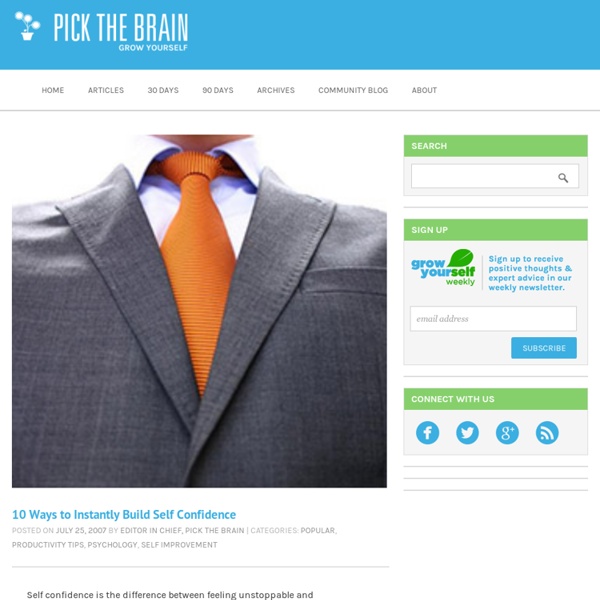The 50th Law
Origins[edit] The 50th Law grew out of the friendship and mutual admiration between 50 Cent and Robert Greene.[7] Greene's book The 48 Laws of Power, which has long been a staple in the hip hop world, came to the attention of 50 Cent, who asked his manager to arrange a meeting. Greene said that he was surprised by 50 Cent's persona and was impressed by his "Zen-like calmness" and eye for strategy.[8] The two began to work on a book project that would combine their two worlds.[8][9] According to Greene, 50 Cent is an example of what Machiavelli called a New Prince, a leader who emerges in a time of chaos or turmoil and rewrites the rules.[8] According to 50 Cent, Greene's books describe the laws and strategies used by hustlers on the street, even if they might not know the "technical terms" for what they were doing.[10] Synopsis[edit] Reception[edit]
Fake it Till You Make it: 10 Ways to Feel Confident (Even When You Aren’t)
“Original Fake” Photo Credit: courtesy of MashKulture Is your self-confidence natural, or a daily struggle? Many people’s confidence naturally wavers from day to day, leaving them too timid or confused at just the wrong time. Whether you are naturally confident or could use some better eye contact with your life, setting in place a few simple strategies goes a long way to stoke your inner confidence.
My Collection of Funny Emails. Send funny emails to your friends!
Why didn’t I think of that? You’ll be uttering those words more than once at these ingenious little tips, tricks and ideas that solve everyday problems... some you never knew you had! Hull strawberries easily using a straw. Rubbing a walnut over scratches in your furniture will disguise dings and scrapes. Remove crayon masterpieces from your TV or computer screen with WD40. (also works on walls).
How to Be a Perfect Girl: 12 steps (with pictures)
Edit Article Looking PerfectBeing Your Best Self Edited by Dlpn, Papawheelie87, Kals, Zoe Volt and 105 others Have you ever wondered how to be perfect? Don't you wish there was a guide that could tell you how to be the best that you could possibly be? Your wish has been granted!
The 6 Keys To Being Awesome At Everything
I've been playing tennis for nearly five decades. I love the game and I hit the ball well, but I'm far from the player I wish I were. I've been thinking about this a lot the past couple of weeks, because I've taken the opportunity, for the first time in many years, to play tennis nearly every day.
The 33 Strategies of War
Reception In the book Greene reveals that "Afghanistan was rich in natural gas and other minerals and had ports on the Indian Ocean".[14] The political tales in the book are said to be "mostly foolish or just plain wrong".[15] The book has "far too many duff sentences",[5] for example: "Your goal is to blend philosophy and war, wisdom and battle, into an unbeatable blend."[5][16] It has sold more than 200,000 copies.[17]
Mental Heuristics Page
A heuristic is a "rule-of-thumb", advice that helps an AI program or human think and act more efficiently by directing thinking in an useful direction. Some of these heuristics are age-old wisdom, bordering on cliche, but most are actually helpful. If you want something done, do it yourself Comment: Obviously true, and doing it is usually very good for your self esteem. A surprising amount of work can be done this way, and experts are not always necessary. However, there is a risk of becoming overworked if you try to do everything yourself - we all need other people after all.
50 Things Everyone Should Know
by Mark and Angel Self-reliance is a vital key to living a healthy, productive life. To be self-reliant one must master a basic set of skills, more or less making them a jack of all trades. Contrary to what you may have learned in school, a jack of all trades is far more equipped to deal with life than a specialized master of only one. While not totally comprehensive , here is a list of 50 things everyone should know how to do.
Coaching, Courses & Community for Gutsy Woman
This one is for you. Yes, you. I know that life can be frustrating and scary and overwhelming sometimes.
Grant Study Reveals What Makes Us Happy
He lives near San Francisco, makes more than $50,000 per year, and is voting for the billionaire to fight against political correctness. For several days, I’ve been corresponding with a 22-year-old Donald Trump supporter. He is white, has a bachelor’s degree, and earns $50,000 to $60,000 per year. He lives near San Francisco.
The Art of Seduction
Synopsis[edit] Reception[edit] Greene considers himself a Reformed Rake, one of the types of seducers mentioned in the book,[14] and states that he used the book's techniques to attract his current girlfriend, Anna Biller.[19] He is working to develop a television series based on the book.[12] References[edit] External links[edit]



